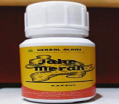Red ginger (Zingiber officinale var. rubrum) nanoparticle extracts on reducing the blood pressure for postpartum hypertension

Downloads
Additional Files
Background: Red ginger contains flavonoids, which can cause vasodilation and decreased cardiac output and pressure. Previous research on red ginger on blood pressure has been carried out and showed significant results. However, it has yet to be studied in nanoparticle extracts, where nanoparticles are the best drug carrier system, so it is necessary to research.
Purpose: Making and testing red ginger nanoparticle administration (Zingiber officinale var. rubrum) to reduce blood pressure in hypertensive postpartum mothers.
Methods: This is an experimental study with a pre-post control group design. The sample consisted of 40 postpartum hypertensive mothers divided into two groups, namely 20 interventions and 20 controls. The intervention group was given red ginger nanoparticles made using the bottom-up method with a dose of 300 mg and the antihypertensive drug nifedipine, while the control group was given the antihypertensive drug nifedipine alone; both were given for two weeks. Data analysis used the Independent t-test and reapeted ANOVA tests.
Results: The systolic blood pressure in the intervention group decreased by 12.95 mmHg on the 7th and 28.4 mmHg on the 14th day (p<0.001) while the control group was 7.05 mmHg on the 7th day and 14.8 mmHg on the 14th day (p<0.001). Diastolic blood pressure in the intervention group decreased by 3.55 mmHg on the 7th day and 11.90 mmHg on the 14th day (p<0.001), while the control group was 2.88 mmHg on the seventh day (p<0.007) and fifth day 35 mmHg on day 14 (p<0.002).
Conclusion: Giving red ginger nanoparticles can reduce blood pressure in postpartum hypertensionAuthors retain copyright and grant the journal right of first publication with the work simultaneously licensed under a Creative Commons Attribution-NonCommercial 4.0 International License that allows others to share the work with an acknowledgement of the work's authorship and initial publication in this journal.
Authors are able to enter into separate, additional contractual arrangements for the non-exclusive distribution of the journal's published version of the work (e.g., post it to an institutional repository or publish it in a book), with an acknowledgement of its initial publication in this journal.
Authors are permitted and encouraged to post their work online (e.g., in institutional repositories or on their website) prior to and during the submission process, as it can lead to productive exchanges, as well as earlier and greater citation of published work (See The Effect of Open Access).

This work is licensed under a Creative Commons Attribution-NonCommercial 4.0 International License.











